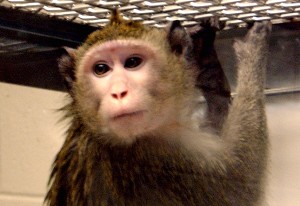Basso testified about her firsthand experiences with “animal rights terrorism,” such as receiving unwanted magazine subscriptions, home demonstrations, and local activists campaigning to open a museum. She has never been the target of violence, and said of this campaigning: “…I can’t stress the critical impact that this has had on me and my ability to do my work.”
Well, it looks like animal activists were not nearly as great a threat to Basso’s career as Basso herself.
She was recently suspended from working with animals, a “rare move prompted by what officials called a ‘clear pattern’ of problems with animal welfare.” According to the Wisconsin State Journal:
University administrators say researcher Michele Basso has had a bumpy history, citing a lack of respect for veterinarians, incomplete record-keeping and instances where monkeys developed brain injuries…
It is unusual for the university to suspend a main researcher’s work with animals, and officials say they only do so when they perceive that the risks to animals outweigh the benefits to science and medicine…
In other words, university officials came to the same conclusion as the “terrorists,” that the results of Basso’s experiments were not worth the cruelty.
Examples like this illustrate the government’s backwards priorities. Rather than catering to special interest groups and labeling political activists as “terrorists,” perhaps lawmakers should be listening to, and acting on, their concerns.
